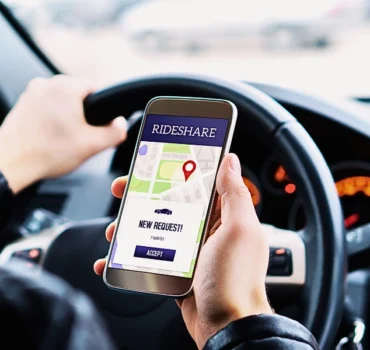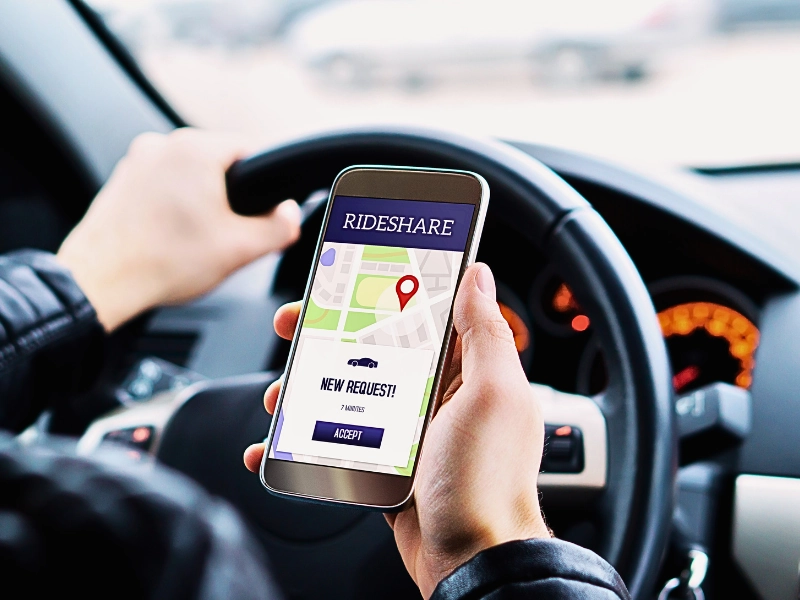The Rise of Rideshare and Self-Driving Car Accident Claims in Houston

While the increased usage of rideshare services and self-driving cars is transforming transportation in Houston, accident statistics involving these vehicles have also risen. A study linked rideshare services to a 2-3% increase in the number of fatal crashes. Houston recorded its highest number of traffic deaths ever in 2024. The number of self-driving incidents that have occurred in Houston and the rest of Texas have resulted in the state consistently ranking second for these incidents in the nation.

Rideshare and self-driving car accident claims are different from regular car accident claims. Understanding these differences helps you know the appropriate steps to take if you’re involved in a crash.
If you’ve been involved in a car accident in Houston, call Bradshaw Law at 775-738-7444 for help with seeking fair compensation.
Table of Contents
Liability Challenges in Houston Rideshare Accident Claims
Determining liability is one of the most challenging components of rideshare accident claims. The main issues include:
Multiple Parties
Rideshare accident claims may involve multiple parties, including the rideshare driver, the driver’s personal insurance, the ridesharing company and its insurer, and other drivers and their insurers. Coordinating with these parties and insurers during the rideshare injury claim process can be a daunting task.
Driver Classification
Rideshare companies classify drivers as independent contractors rather than direct employees. This limits the companies’ direct liability for accidents resulting from the drivers’ negligence. In most cases, you won’t be able to sue the rideshare company directly because of the actions of its driver. Nevertheless, you can sue a rideshare company in cases where its own negligence contributed to the accident, such as failure to remove or suspend an unsafe driver.
Business Use Exclusion
Most personal auto policies exclude commercial driving activities. Therefore, even when a rideshare driver is at fault for a crash, his or her insurance company may refuse to pay for damages.
Driver Status at Time of Crash
The insurance coverage provided by ridesharing companies varies depending on a driver’s status at the time of the accident:
- Offline: When the rideshare driver wasn’t logged into the app at the time of the accident, only the driver’s personal auto insurance will apply.
- Online but waiting for a ride request: When a rideshare driver is logged into the app and awaiting a ride request, a lower-tier policy from the ridesharing company (usually up to $50,000 per person for injuries and $100,000 per accident) may apply.
- Accepted a ride or transporting a passenger: Once a driver accepts a ride request and is en route to pick up or is transporting a passenger, rideshare companies offer their highest level of coverage, which for Uber and Lyft is up to $1 million of liability coverage.
Even though rideshare companies have different levels of insurance policies in place, they won’t necessarily make recovering compensation easy for you. Injured victims benefit from engaging an experienced car accident lawyer familiar with local regulations and rideshare crashes. A Houston rideshare accident lawyer will help you gather app data, ride logs, and other pieces of evidence, deal with rideshare companies and negotiate with insurers on your behalf, and explore every option available to maximize your compensation.
How Self-Driving Car Crashes Are Handled Under Texas Law
According to a National Highway Traffic Safety Administration (NHTSA) study, the top causes of car accidents in the fall, such as impaired driving and speeding, and other driver errors cause 94% of motor vehicle accidents. Self-driving cars aim to eliminate human error by utilizing a combination of cameras, sensors, and artificial intelligence to make driving decisions and navigate roads safely. Crash data shows that these autonomous vehicles are not flawless. Software glitches, sensor failures, human error, and adverse weather conditions are some of the factors that have led to self-driving car accidents.
Texas law allows companies to deploy self-driving cars on public roads as long as they’re insured, fitted with a video recording system, and are capable of following all traffic regulations. The manufacturer may be liable for injuries and damages resulting from an accident in which a system failure was a contributing factor.
According to the Texas Transportation Code, the owner of a self-driving car is considered the operator of the car solely for the purposes of assessing compliance with the applicable motor vehicle and traffic laws, even if the individual isn’t physically present in the vehicle while it’s operating. If an accident occurs, the operator’s actions are evaluated to determine if his or her actions contributed to the crash. A vehicle owner or driver could be held liable for the crash, for example, due to failure to maintain the vehicle properly or take control when human intervention was required, or if the driver made a mistake while the car was in manual mode.
Other parties that could be held liable for crashes include software developers, component suppliers, entities responsible for the car’s autonomous systems, other drivers, and the government agency in charge of road maintenance. Texas at-fault laws allow multiple parties to share responsibility for an accident. Injured victims can recover compensation even if they’re found to be partially at fault for the crash, as long as they’re less than 51% at fault for the crash. Any compensation awarded will be reduced in proportion to the victim’s percentage of responsibility.
With self-driving technology being relatively new, laws governing it are still evolving. Thorough investigations are crucial to identify the liable parties and take the appropriate legal action. Self-driving car accidents usually require gathering more evidence than regular car accidents. Evidence may include:
- System logs
- Camera footage from the vehicle
- Sensor data
- Software diagnostics
- Accident reconstruction reports
- Maintenance reports
Going up against car manufacturers, tech companies, and their powerful legal teams is often a daunting experience for victims of self-driving vehicle accidents. If there were children involved in the accident, the claims process gets even more complex. Legal guidance is important to navigate the claims process.With over 15 years of experience, Houston car accident lawyer Denise Bradshaw can help you preserve evidence and file your case. Contact us today to schedule your free consultation.


